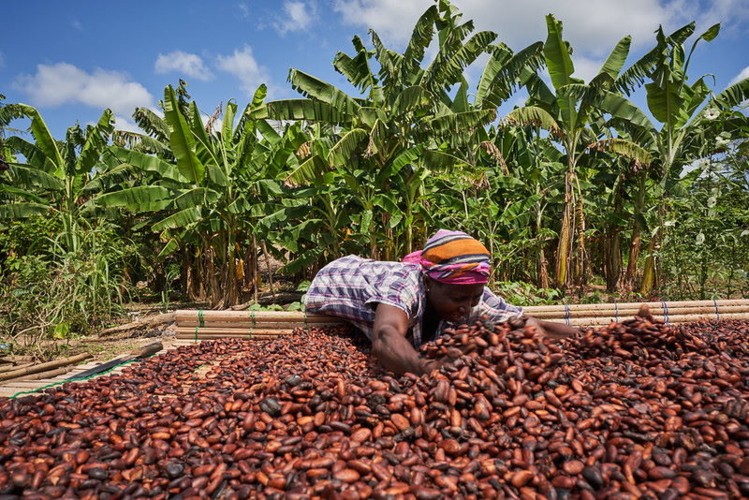Ghanaian Think-thank Imani has been cited by the world’s leading global business publication, the Financial Times (FT) for the organization’s ground-breaking work on the cocoa value chain.
The article by FT centres on the struggle of Ghana and Ivory Coast, the two leading Cocoa producers in the world, to boost farmer incomes from the “commodity that underpins a $100bn industry.”
It reveals that the 100,000 cocoa farmers who are part of the Kuapa Kokoo co-operative — Ghana’s only farmer-owned cocoa organisation—find it difficult to make ends meet “despite producing the raw material for a global chocolate industry worth an annual $100bn in retail sales.”
In a bid to alleviate poverty, Ivory Coast and Ghana added a supplement to the sale price of the commodity. The $400-a-tonne supplement termed the “Living Income Differential” (LID) was added to the price of cocoa bought from West African neighbours which was harvested from this crop year.
The two countries have in the past few years, joined forces to try to increase farmers’ earnings — just 6.6 per cent of the sale price of a bar of the confectionery, according to the Cocoa Barometer, published by Voice Network, an umbrella group for 17 nongovernment organisations.
The article however indicates how “a dispute over whether global buyers were prepared to pay, illustrates how hard it will be for the two nations to control and lift prices in an industry dominated by millions of smallholders.”
“We are not asking too much from industry, just meet our cost of production and help us get something small to live,” said Mr Okyere, Head of Ghana’s Kuapa Kokoo co-operative. “I don’t think it’s too much to ask, because once they do that they can still make big profits.”
The Ivorian Conseil du Café-Cacao and the Ghana Cocoa Board have accused chocolate producers of trying to avoid the LID in letters circulated in the industry this month, according to the article.
This comes after US group Hershey took the unusual step of sourcing cocoa beans from the futures market in New York. Analysts said this meant it did not have to pay the supplement, although Hershey said it was supportive of improving farmers’ livelihoods.
Authorities in both nations responded by banning Hershy from operating sustainability programmes on their soil — initiatives businesses are keen to support amid increasing global focus on sustainability and issues such as deforestation and child labour.
Kobi Annan, an Accra-based consultant at Songhai Advisory, a business intelligence firm intimated that Ivory Coast and Ghana sought to punish Hershey by suspending programmes despite their benefits for farmers.
By cancelling the initiatives, they wanted to hold more cards “when we sit down and solve this big problem: why do countries who produce 60 per cent of a commodity have no real power in setting its price?”
But ultimately, said a Ghanaian official speaking on condition of anonymity; “Your negotiating position is not that strong, so you’re entirely dependent on public sentiment, environmental sustainability concerns, child labour concerns, income inequality concerns, to make the other party feel a little guilty so they contribute more.”

The increasing farmgate prices set by the government and an increase in sustainability programmes which have encouraged millions of small farmers who are desperate for cash to produce more thereby weighing on market prices, has been identified as part of the problem.
According to the International Cocoa Organisation of producing and consuming countries, global cocoa output has grown 18 per cent over the past five years to 4.7m tonnes, with top producer Ivory Coast producing 2.1m tonnes in the last crop year, up almost a third. Ghana produced 800,000 tonnes, up 3 per cent.
“If you want [world] prices to rise, you do not produce considerably more than the market needs,” said Derek Chambers, former head of cocoa at French trader, Sucden.
The article admonishes that brokers and analysts have said efforts by Ivory Coast and Ghana to collaborate and control prices would struggle — partly because of smallholders’ desire for cash and rival producers’ ability to expand market share.
“It’s a very difficult situation,” said Bright Simons, a researcher at Ghanaian think-tank Imani.
“Ultimately cartels struggle in commodities,” he added. “That’s the lesson of the last couple of decades.”
Meanwhile, with 2020 being an election year in the two countries, both governments raised the price by about 20 per cent to $2,600 a tonne, still $500 less than the Cocoa Barometer estimates farmers need to earn a living wage.
This has sparked concerns from analysts who anticipate that Ivory Coast and Ghana will be “left holding unsold cocoa in a year when the harvest is expected to be at record levels.”
Jonathan Parkman representing commodity brokers, Marex Spectron stated a frustration over a lack of transparency and accountability around the LID operation by buyers.
“The LID is going to have to be reformed. It’s not sustainable as it is over time,” he said.





















